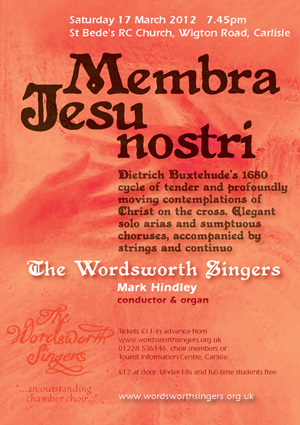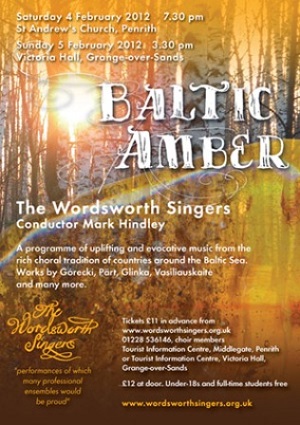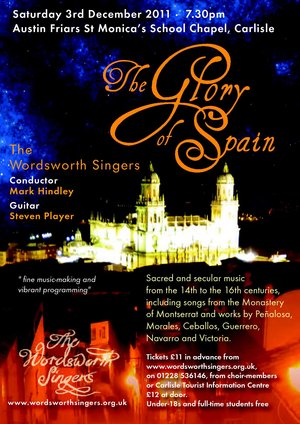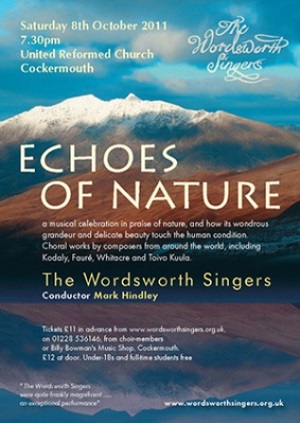Guest Musicians
Emma Ferrand
Steven Player
Venues
St John’s Church, Keswick
St Bede’s RC Church, Carlisle
St Andrew’s Church, Penrith
Victoria Hall, Grange-over-Sands
Austin Friars School, Carlisle
United Reformed Church, Cockermouth
Song of Songs

The Wordsworth Singers’ concert given last Saturday in St John’s Church Keswick took as its theme choral music inspired by the exuberant text of the “Song of Solomon” in the Old Testament. Mark Hindley, Director of Music, doesn’t shy away from challenging his singers and introducing them to both demanding and unfamiliar repertoire. I felt they were particularly successful with the later works which required a more homogenous sound and less equality across the vocal parts. The contemporary composer Howard Skempton’s four movement Rise up my love relies almost totally on constantly shifting sensuous harmonies. The first movement was absolutely beautiful with perfectly controlled singing, excellent diction and clarity. The second movement is written for men’s voices only and demonstrated the richness and depth of singing in the bass section. The third movement My beloved is gone down for sopranos and altos was a vehicle for the excellent singing of this very proficient group whilst the final movement How fair and how pleasant was absolutely ravishing.
For me the high points of the concert were the two settings from Lieder der Liebe by the Swiss composer Carl Rütti written in 1993, which were accompanied by the cellist Emma Ferrand. These works both demand a choir of the highest standard and the Wordsworth Singers were not found wanting. There was considerable textural interest, with contrasting sections from men’s and ladies’ voices, considerable chromaticism and a cello part which started with harmonic glissandi before becoming more melodic. The second of the Rütti songs Behold begins most effectively first with the cello, then choral speaking before the choir vibrantly takes up the cello’s melody and the composer uses the word “leaping” from the text to drive the music exuberantly forward. The singing was energetic, vigorous and rhythmical and Fiona Weakley’s soprano solo soared above all this making the whole piece dramatic, inspiring and uplifting.
The Wordsworth Singers’ concerts certainly give value for money and space does not allow me to mention the other works by Guerrero, Morales, Grieg, Cipriano de Rore, Monteverdi, Tomkins, Schütz and Walton which were, in the main, successfully performed. In addition to all this we were treated to three solo cello pieces played beautifully by the international instrumentalist Emma Ferrand: four movements from Bach’s first solo suite for cello, Hamabdil by Bantock and, in his anniversary year, Delius’s Romance – both these works being accompanied by Mark Hindley on the piano.
Yet another truly memorable concert by the Wordsworth Singers bringing unfamiliar works to both the performers and listeners.
John Cooper Green
Stokesley
As a member of the choir from 2004-9, it is probably not my place to write an impartial review of this concert, though I have now twice had the pleasure of inviting my old friends to perform in the shadow of more modest hills in North Yorkshire. The reviewer of the Keswick concert sums up my general reaction to the strength of the performance, though I suspect that the slight reserve in his judgement on some of the older polyphonic pieces might well have been moderated by a second hearing the following day. The confidence and blend of the choir made a programme that will have been quite unfamiliar to many in the audience speak with power. Once more, the Skempton and Rutti dazzled; performed with a virtuosity that had the local audience talking with admiration for some time afterwards. Again, Emma Ferrand’s performances of Bach and twentieth century English pieces, as well as the Rutti, were eloquent, passionate and fluent in the extreme. It is a constant theme of recent Wordsworth reviews that the choir’s programmes continue to stimulate and educate, and their already high standards continue to rise. In the two years since their last Stokesley concert, with further years under Mark Hindley’s direction, this is most certainly true. May it long continue to be so!
Revd Paul Hutchinson
Membra Jesu Nostri

Having recently moved to Carlisle, life is full of new discoveries; new places, new friends and new music. I can, with hand on heart, say that the introduction to the Wordsworth Singers has been a highlight amongst the newness.
I was fortunate enough to be amongst the audience at a performance of Buxtehude’s Membra Jesu nostri, a work new to me, in the resonant and movingly appropriate setting of St Bede’s Church, Wigton Road. The work, written in 1680 to Latin poetry ascribed to Arnulf of Louvain (d.1250) is in seven contrasting movements or cantatas, each addresses a part of Christ’s body and begins with a biblical quotation. The colourful paintings behind the altar depicting scenes from Christ’s life were therefore the perfect backdrop to ‘a very personal meditation on the suffering of Christ and a very public profession of Faith and confidence in the salvation of mankind’.*
The piece, often called the first Lutheran oratorio, is exquisitely engaging in the perfect marriage of text with the vocal and instrumental writing. Each cantata has an instrumental introduction which the voices join seamlessly. There is much variety in the vocal and instrumental settings. At its full complement in Cantata VI the instrumentation is for a five part Consort of Viols and Continuo. We hear exposed writing for one or three voices and full choral settings of up to 5 parts. We hear wonderfully complex rhythms and spine tingling dissonances and resolutions.
This piece was given by musicians who were completely committed to it and who expressed themselves in myriad instrumental and vocal colours. The instrumental playing was enthralling throughout, especially the dialogue between the two violinists, Anna Östberg and Katie-Bethan Holmes. The solos and ensemble singing were at times moving in their elegant beauty and at other times affecting in their strength. Particularly touching for me was the singing of Julie Leavett and Fiona Weakley in Cantata VI To the heart – You have wounded my heart, my sister, my bride, you have wounded my heart. From Song of Songs, the pathos was expressed through sensitive and refined singing.
Within the finely balanced full choir, the many textures and colours were executed with carefully judged energy. There were memorable moments of the most glorious sound from the women’s voices alone and within the most complex polyphony from the men and women were clear and rich lines. This full sound which was at the same time delicate was shown to full effect in VII To the face – Let your face shine upon your servant, save me in your mercy, where appropriately enough, the sound from the sopranos was wonderfully shiny. The joyful final Amen was luscious, and exciting with its ‘outrageous cross rhythms’.*
Mark Hindley led both singers and instrumentalists from the chamber organ, with a fine, understated subtlety. An organ solo by Sweelinck played in each half of the concert by Mark gave space to meditate on the music and surroundings, bringing the singing into relief.
Generous applause showed the depth of the audience’s appreciation for a wonderful evening of music making. I left light of step, having experienced a first which will definitely not be a last.
* from Mark Hindley’s programme notes
Charlotte Jackson
Baltic Amber

Grange-over-Sands
The task of putting together a programme which has a strong theme and plenty of variety requires skill and imagination and the Wordsworth Singers’ concert conducted by Mark Hindley at the Victoria Hall, Grange-over-Sands, was an exceptional achievement in this respect. “Baltic Amber” was the evocatively titled programme which contained music by composers from the Baltic States.
The concert opened with the Cherubic Hymn by Glinka and the wonderfully sustained sonorous chords at the outset and lively and radiant final Alleluias showed that this choir, which I have known for many years, has never been on better form. Arvo Pärt’s Magnificat maintained this excellent standard – here special mention must be made of Fiona Weakley’s clear and confident sustained notes, which did much to ensure security of pitch in spite of a couple of small tuning lapses within the choir.
Buxtehude’s Missa Brevis took us back to the 17th century and here the singers showed precision, rhythmic energy as well as lively elegance. The beautifully controlled ending was particularly impressive.
Kristina Vasiliauskaite’s Jeremiah Song brought us back to the 21st century and the singers revelled in its approachable harmonic style and rich textures. The first half closed with Hugo Alfvén’s Aftonen (Evening) and the lush harmonies evoked a calm evening sunset with the chorus humming being particularly effective.
The second half continued to delight with more controlled and expressive singing. Three motets by Peter Lange-Müller were notable for their elegant dance-like rhythms and some diligent work had been done on Danish pronunciation. For me the highlight was Long Road by Eriks Esenvalds; here, there were rich, beautifully tuned harmonies and most effective juxtaposition of main chorus and semichorus. The addition of pipes and gentle bells in the final bars was absolutely magical.
The concert ended with Górecki’s Totus Tuus, written for the third return visit of Pope John Paul II to his native Poland in 1987. This was an impassioned performance with the singers coping effortlessly with the long sustained passages and challenging key-changes.
It was an inspired idea to involve the pianist Sam Hutchings and his well chosen Russian pieces provided an effective contrast in each half of the concert.
We departed feeling very happy that we had braved the snowy conditions to enjoy what was one of the best choral concerts heard in this area for a very long time.
Hugh Davies
Penrith
In the fifteen years since their formation The Wordsworth Singers have established a considerable reputation as a chamber choir, both in the quality of their performances and in the imaginative content of their programmes.
“Baltic Amber”, presented in St. Andrew’s Church, Penrith on an evening of appropriately Baltic winter temperature, showed ample evidence of both. The music chosen represented each of the nine states which have a coastline on the Baltic Sea. As well as giving a flavour of the music of each of these countries, it gave the audience a chance to savour music of different periods from the rich 17th century polyphony of Buxtehude’s beautifully phrased Missa
Brevis to the sumptuous harmonies and novel effects of Erik Esenvalds’ Long Road, written as recently as 2010.
The opening piece, Glinka’s Cherubic Hymn with its mystical opening, adventurous chromatic writing and joyful Alleluia was followed by Arvo Pärt’s Magnificat, in which the composer uses endlessly ingenious combinations of voices and dissonances around a central held note to create some innovative and unique sounds. The choir, under the skilled direction of Mark Hindley, showed excellent control of phrasing, tuning and dynamics throughout this deeply felt and intensely personal work.
Both Kristina Vasiliauskaite’s Jeremiah Song and Hugo Alfvén’s The Evening offered mesmerising and lush harmonies while Einojuhani Rautavaara’s Departure offered an intriguing background sound of horse’s hooves from men and women’s voices in turn.
Undoubtedly one of the highlights of the evening was the final work, Henryk Gorecki’s Totus Tuus, the resplendent chordal opening and the ensuing spacious harmonies leading to a prayerful ending, in which the gradually subsiding dynamics were controlled with the utmost sensitivity.
Russian piano music by Borodin, Glinka and Tchaikovsky, played by Sam Hutchings, made an effective contribution
to an evening in which The Wordsworth Singers’ reputation as an outstanding chamber choir was stylishly maintained.
Colin Marston
The Glory of Spain

Few people I suspect know much Spanish sacred music other than that of Tomas Luis de Victoria, whose monumental Magnificat Primi Toni and resplendent Salve Regina constituted the finale of a fascinating journey through two centuries of rich musical tradition.
The rawness of a rousing 14th century Virelai gave way to the quasi-plainsong O virgo splendens in which the Wordsworth Singers’ unanimity of pitch and blend enabled the round’s striking dissonances to be keenly felt despite the chapel’s generous acoustic. Likewise there was commendable clarity in the densely packed vocal lines of two pieces for lower voices by Penalosa.
The return of the sopranos heralded a heightening of emotional intensity in Morales’ O sacrum convivium, whilst the stark simplicity of Parce mihi Domine tested the singers’ ability to maintain perfect intonation without rhythmic stimulus. If there was a hint of tiredness in Ceballos’ slow moving Hortus conclusus, an energetic performance of O Virgo benedicta more than made amends.
Guerrero’s 12 part Duo seraphim provided a stunning start to the second half, and in the six part Maria Magdalena a thrilling climax at the word ‘surrexit’ was heightened by the restrained opening section. An exuberant Regina caeli by Navarro contrasted with the slow harmonic rhythm of In passione positus, after which Gordon Ferries gave the singers a well deserved break with his flawless playing of Spanish baroque guitar music. Earlier in the programme he had contributed a set of French Renaissance pieces.
Conductor Mark Hindley is to be congratulated on resurrecting so much unjustly neglected music and for eliciting from the choir performances of which many professional ensembles would be proud.
Jeremy Suter
Echoes of Nature

The United Reformed Church, Cockermouth, echoed to bucolic birdsong, babbling brooks, undulating seas and crepuscular landscapes, in the Wordsworth Singers’ first concert of the season. “Echoes of Nature” was a fitting title for what was a very daring and thought-provoking programme.
The evening’s entertainment focused on the upper voices of the choir, and as the backbone to the programming here, were the excellent yet unusual Hegyi Éjszakák (Mountain Nights) by Kodály. These five wordless songs were performed wonderfully, despite difficult intervals and entries.
Three other modern composers were also featured (this time with the gentlemen of the choir intow); Gabriel Jackson, Eric Whitacre and Javier Busto. The first two of these composers really did paint vivid pictures, yet it is one thing to be able to produce such works of, yes, beauty, and another to be able to sing what the composer demands. The choir did both in executing this tremendously difficult music and portraying it so assuredly. The piece by Busto Sagastipean was a tour de force; a foot stamping folk dance from the Basque Country; the choir revelled in its colourful intensity as did the audience. At the end, the piece simply faded away in one of the most controlled diminuendos I think I’ve ever heard!
Of the other music performed were some rare treats: Sur la mer (d’Indy), Le Ruisseau (Fauré) and Les nymphes des bois (Delibes) all of which were superbly performed. The range of dynamics in these pieces was very wide, the performers swelling from pianissimo to fortissimo in one short phrase. However, in some of the louder passages, a less confined acoustic would have been more suitable. The only piece that seemed a little out of keeping was perhaps Schubert’s Gott in der Natur. It was not performed quite as confidently as much of the other music, and at a couple of points it felt a little under-rehearsed.
Conductor, Mark Hindley, has a wealth of experience as regards choral conducting. He obviously has a great rapport with the choir and is able to draw from them the very best singing and understanding of the score. The choir were indeed fixed on his every gesture; every nuance indicating entry, breath control, phrasing and dynamics was noticed and acted upon, making the concert a joy to watch as well as listen to.
Sam Hutchings provided the accompaniment for several of the pieces. Being an accompanist is an art. Sam’s sensitive skill at the keyboard was a delight, gently underplaying his part enabling the choir to shine through. He also provided two interludes, in the form of solo piano pieces (Schubert and Liszt). Here, I feel he could have projected the music more or had a little more presence on stage musically. However, the pieces were very well played, especially the phrasing during the Schubert.
This really was a first class concert. It is a pity and a real worry that there weren’t more people in the audience to relish the fine music-making and vibrant programming. If we stand idly by, and do not lend our support to such musical groups, they will cease to exist. Well done Wordsworth Singers, the applause said it all, we wanted more!
Philip Wood





